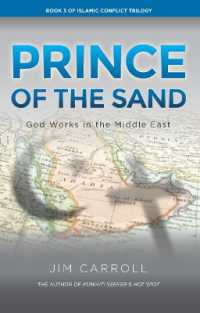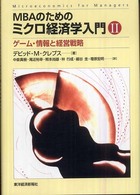- ホーム
- > 洋書
- > 英文書
- > History / World
Full Description
For over four decades, the Cold War superpowers endeavored mightily to "win hearts and minds" abroad through strategies that came to be called public diplomacy. While many target audiences were on the original front lines of the conflict in Europe, other larger audiences resided in areas outside Europe, regions then in the throes of decolonization. This book explores how, for all the blood and drama of intervention, crisis, and revolution during the Cold War, the vast majority of these non-Europeans experienced it as a media war for their allegiance rather than as a violent war for their lives. In these outlying regions, superpower public diplomacy encountered volatile issues of race, empire, poverty, and decolonization--all of which intersected unpredictably with the dynamics of the Cold War and anti-imperialist currents. The challenge to U.S. public diplomacy was acute. At a time when the United States' image was inseparable from Jim Crow and Washington's European-imperial alliances, the cresting of these issues put U.S. outreach on the defensive.
Yet, as Jason Parker argues, the greater consequence of these Cold War campaigns was international, not U.S.-centric, in scope. The non-European world responded to this media war by joining it. A proliferation of newly independent voices launched public diplomacy campaigns of their own, offering a roundabout validation of strategic public diplomacy while articulating an alternative vision of the postwar world. By reappropriating the geopolitical and intellectual space between the Cold War superpowers, this global conversation formulated a "Third World project" that coalesced around principals of nonalignment, post-imperial economic development, and anti-colonial racial solidarity. The global South's response to the injection of the Cold War into their social, economic, and political reality thus helped to create the "Third World" as a transnational, imagined community on the postwar global landscape.
Contents
Preface and Acknowledgments
Introduction : In the Beginning Was the Word
Chapter 1: Absent at the Creation: The Truman Administration's Public Diplomacy Outside Europe
Chapter 2: Hearts and Minds on New Frontlines: The Public Diplomacy of the Korean War in Asia
Chapter 3: Pawns, Proxies, and Pressing the Case for the "Free World": The USIA and Ike's New Look
Chapter 4: A "New Babel of Voices": Cacophony and Community in the Decolonizing World
Chapter 5: "Mucha Alianza, Poco Progreso": The Alliance for Progress and the Development of the "Third World"
Chapter 6: True Colors: Nonalignment, Race, and the Proliferation of Public Diplomacy in the Formation of the "Third World"
Conclusion: Murrow's Wager
Notes
Bibliography
Index








